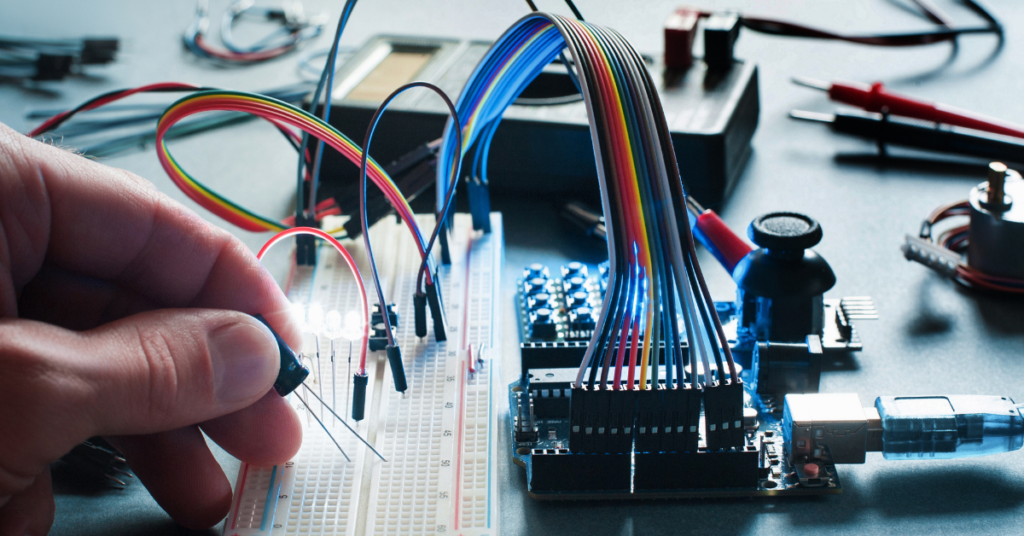
Noida is set to receive a significant manufacturing boost with the government approval for a second electronics manufacturing cluster, EMC 2.0. This initiative, backed by a ₹417 Cr investment, aims to bolster local manufacturing and foster innovation within the electronics industry. The Union Government, operating through the Ministry of Electronics and IT, has given the green light for establishing the Electronics Manufacturing Cluster (EMC 2.0) in Noida, Gautam Buddha Nagar, Uttar Pradesh.
Senior officials, including IT Minister Ashwini Vaishnaw and Minister of State Jitin Prasada, reviewed the project, highlighting its importance. The Yamuna Expressway Industrial Development Authority (YEIDA) will spearhead the industrial development of the Electronics Manufacturing Cluster 2.0 in Noida. Spanning across 200 acres, this cluster is anticipated to attract investments of approximately ₹2,500 crore, further catalysing economic growth in the region.
Recognising the state government’s critical role, officials have been directed to collaborate closely with Uttar Pradesh authorities. This collaborative approach aims to ensure the swift and efficient execution of the project, maximising its positive impact on the local economy and the broader electronics industry.
The establishment of the electronics manufacturing cluster in Noida is projected to unlock substantial investment opportunities and create numerous jobs within the region. The anticipated ₹2,500 crore investment is expected to spur industrial development and attract both domestic and international companies involved in the electronics industry. This influx of capital will not only boost the local economy but also enhance Noida’s reputation as a prime destination for electronics manufacturing.
Beyond the direct financial investment, the EMC 2.0 initiative promises a significant manufacturing boost to the job market. The cluster is forecast to generate a multitude of employment opportunities across various skill levels, ranging from highly skilled engineers and technicians to assembly line workers and support staff. This job creation will positively impact the livelihoods of thousands of families in Uttar Pradesh and contribute to the overall socio-economic development of the region. The government approval reflects a commitment to strengthening the electronics manufacturing sector and fostering economic prosperity through targeted investment and industrial development.
The ₹417 Cr investment in infrastructure and facilities within the electronics manufacturing cluster is strategically designed to support the growth and competitiveness of businesses operating within the park. By providing access to world-class infrastructure and shared resources, the EMC 2.0 aims to lower operational costs and enhance productivity for companies. This will further incentivise investment and expansion, leading to even greater job creation and economic growth in the long term. Noida is set to become a hub for innovation and manufacturing excellence, attracting talent and driving economic prosperity for years to come.
Despite the promising outlook, the Noida electronics manufacturing cluster faces several challenges. Securing a consistent supply chain for raw materials and components is crucial. Fluctuations in global markets and geopolitical factors could disrupt the availability and pricing of essential inputs, potentially impacting production schedules and profitability. Furthermore, attracting and retaining skilled labour remains a key concern. The electronics industry requires a highly trained workforce, and Noida must invest in skill development programs to meet the growing demand. Competition from other manufacturing hubs, both within India and internationally, poses another challenge. Noida needs to differentiate itself by offering a competitive business environment, streamlined regulatory processes, and robust infrastructure.
Looking ahead, the future of the electronics manufacturing cluster hinges on continuous innovation and adaptation. Embracing new technologies, such as automation and artificial intelligence, is essential to enhance productivity and efficiency. Furthermore, fostering collaboration between industry, academia, and research institutions can drive innovation and create a vibrant ecosystem. The government approval and ₹417 Cr investment provide a strong foundation, but sustained effort is required to ensure the long-term success of the project. Addressing these challenges proactively and capitalising on emerging opportunities will pave the way for Noida to become a leading electronics manufacturing hub and contribute significantly to the growth of the electronics industry in Uttar Pradesh.
Moreover, environmental sustainability needs prioritising. As industrial development intensifies, it’s crucial to adopt eco-friendly manufacturing practices and minimise the environmental footprint of the electronics manufacturing cluster. Implementing waste management systems, promoting energy efficiency, and encouraging the use of renewable energy sources are vital steps. By embracing sustainability, Noida can attract environmentally conscious investors and ensure the long-term viability of the electronics manufacturing cluster.